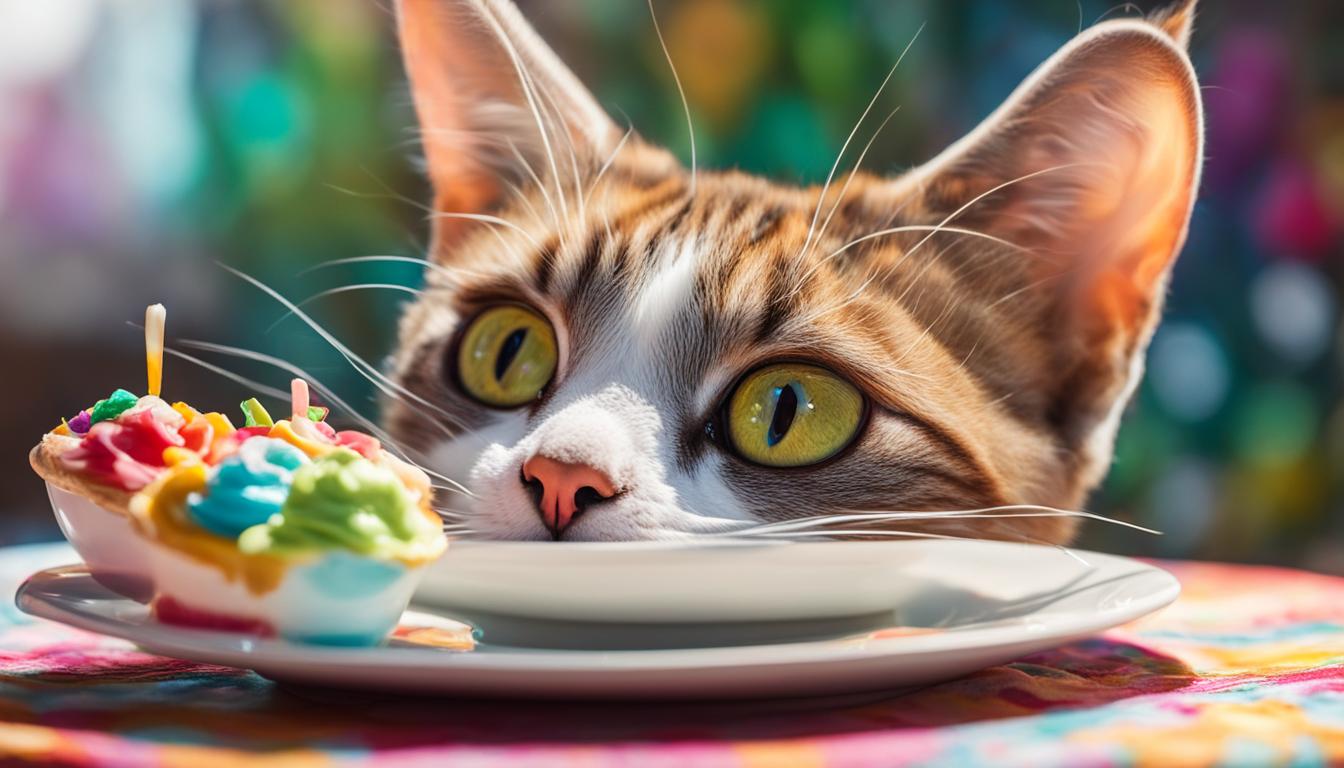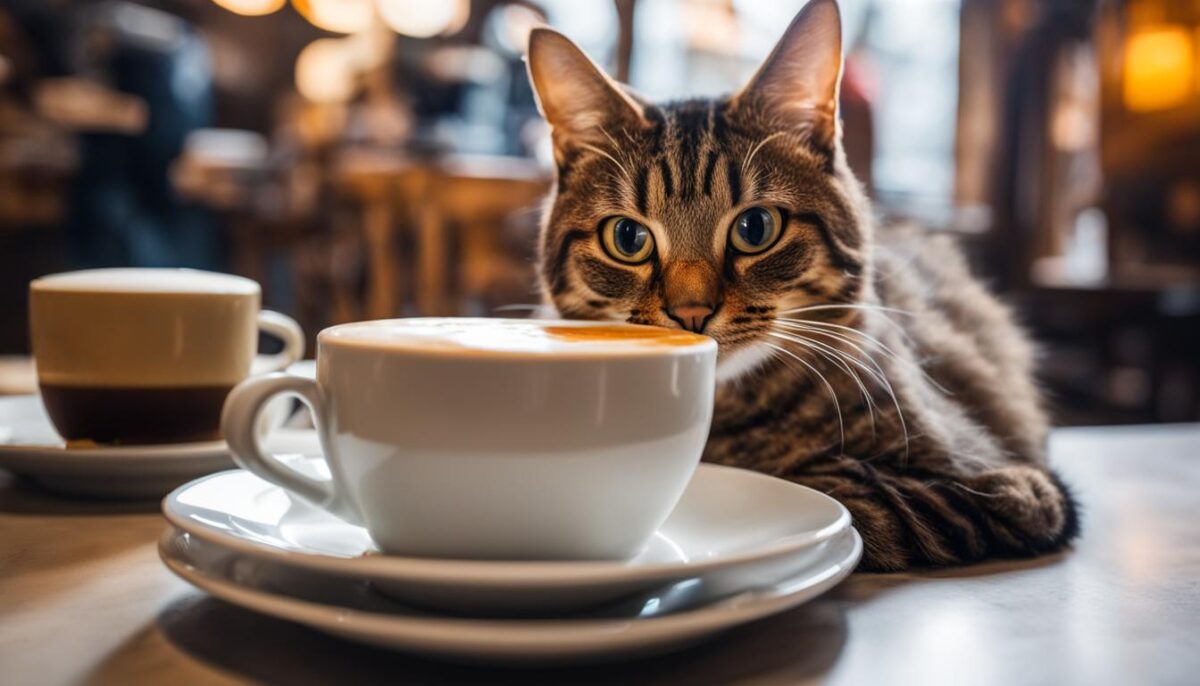If you have a cat and enjoy indulging in sweet treats, you may be wondering if it’s safe to share a little whipped cream with your furry friend. In this article, we’ll explore whether cats can eat whipped cream and if it poses any risks to their health.
Key Takeaways:
- Whipped cream is non-toxic to cats but should be eaten in moderation.
- Cats are lactose intolerant, so consuming whipped cream can cause digestive issues.
- Whipped cream is high in fat, sugar, and calories, which can contribute to weight gain and obesity in cats.
- There are healthier alternatives to whipped cream that you can offer your feline friend.
- Always consult your veterinarian before introducing new foods into your cat’s diet.
What is Whipped Cream Made Of?
Whipped cream is a delicious and fluffy topping that is often used to enhance the flavor of desserts and drinks. But have you ever wondered what exactly whipped cream is made of? Let’s take a closer look at its ingredients.
Whipped cream is primarily made from heavy cream, which is a rich and creamy dairy product. Heavy cream is the high-fat portion of milk that rises to the top when it is left to stand. It is the key ingredient that gives whipped cream its smooth texture and creamy taste.
In addition to heavy cream, whipped cream may also contain sugar to add sweetness. The sugar helps to balance the flavors and make the whipped cream more enjoyable. Some whipped cream products may also include vanilla extract as a flavoring agent, which adds a subtle vanilla taste.
Did You Know?
Whipped cream is often used as a topping for pies, ice cream sundaes, hot cocoa, and other desserts. It can also be used to add a creamy touch to beverages like coffee and milkshakes.
| Ingredient | Description |
|---|---|
| Heavy Cream | The high-fat portion of milk that gives whipped cream its creamy texture. |
| Sugar | Added for sweetness and to balance the flavors. |
| Vanilla Extract | A flavoring agent that adds a subtle vanilla taste. |
While whipped cream can be a tasty treat for humans, it’s important to remember that cats have different dietary needs. The ingredients in whipped cream, such as heavy cream and sugar, can be harmful to cats if consumed in large quantities. Cats are lactose intolerant, and the consumption of dairy products like whipped cream can lead to digestive issues and other health problems.
If you want to treat your cat to something special, it’s best to look for cat-friendly alternatives that are specifically formulated for their dietary needs. Your veterinarian can provide recommendations for safe and healthy treats that your cat will love.
Is Whipped Cream Bad for Cats?
While whipped cream may be a tempting treat for your feline friend, it’s important to understand the potential dangers it poses to their health. The high fat, sugar, and calorie content in whipped cream can have negative effects on cats, leading to various health problems if consumed in large amounts or regularly.
One of the main concerns is weight gain and obesity. Cats are obligate carnivores, meaning they require a diet rich in animal protein. Whipped cream provides no nutritional value and can contribute to excessive weight gain, which can lead to a range of health issues, including diabetes and joint problems.
Additionally, whipped cream can cause digestive issues in cats. Cats are lactose intolerant, and consuming dairy products like whipped cream can result in gastrointestinal problems such as diarrhea, constipation, and vomiting. These issues can be uncomfortable for your furry friend and may require veterinary intervention to alleviate the symptoms.
| Health Problems from Whipped Cream in Cats | Symptoms |
|---|---|
| Weight gain and obesity | Increased body weight, difficulty moving, joint pain |
| Digestive issues | Diarrhea, constipation, vomiting |
It’s best to avoid feeding whipped cream to cats and choose healthier alternatives to ensure their well-being.
If you’re looking for a special treat for your cat, there are cat-friendly desserts specifically formulated to meet their dietary needs. These treats are made with animal protein and provide a more suitable option for satisfying your cat’s cravings without compromising their health.
Remember, always consult with your veterinarian before introducing any new foods into your cat’s diet. They can provide personalized recommendations and guide you in making the best choices for your furry friend’s health and happiness.
Can Cats Have Puppuccinos?
While cats are generally lactose intolerant and should avoid dairy products, they can occasionally have a small taste of whipped cream from a puppuccino. Puppuccinos, which are small cups of whipped cream usually given to dogs by coffee shops, are safe for cats in moderation. However, it’s important to note that whipped cream should still be given in small amounts and should not be a regular part of a cat’s diet.
Whipped cream is high in fat, sugar, and calories, which can be harmful to cats. Consumption of whipped cream can lead to weight gain and obesity, as well as other health issues. It’s best to avoid feeding whipped cream to cats and choose healthier alternatives. Cats are obligate carnivores and do not require whipped cream or other dairy products in their diet.
When offering a puppuccino to your cat, it’s crucial to monitor the amount consumed. While a small taste is usually safe for healthy cats, too much whipped cream can cause gastrointestinal issues such as gas, vomiting, diarrhea, and constipation. If your cat shows any severe or prolonged symptoms, it’s advisable to contact a veterinarian for further guidance.
Comparison: Whipped Cream for Dogs vs. Cats
| Whipped Cream for Dogs | Puppuccinos for Cats | |
|---|---|---|
| Ingredients | Whipped cream | Whipped cream |
| Safe for Consumption | In moderation | In moderation |
| Potential Side Effects | Weight gain, digestive issues | Gas, vomiting, diarrhea, constipation |
As seen in the comparison table above, both whipped cream for dogs and puppuccinos for cats share similar characteristics. They both contain whipped cream as the main ingredient and can be safely consumed by dogs and cats in moderation. However, it’s essential to be aware of the potential side effects, such as weight gain and digestive issues for dogs, and gastrointestinal issues for cats.
What Happens if a Cat Licks Whipped Cream?
If your curious feline gets a taste of whipped cream, it’s important to understand the potential side effects. Cats are generally lactose intolerant, so consuming dairy products like whipped cream can lead to gastrointestinal (GI) issues. Common symptoms of whipped cream ingestion in cats include gas, vomiting, diarrhea, and constipation. These side effects occur because cats lack the necessary enzyme to digest lactose, the sugar found in milk and dairy products.
While the side effects of licking whipped cream are usually temporary and will subside within a few days, it’s essential to monitor your cat’s condition. If your cat experiences severe or prolonged symptoms, it’s best to seek veterinary advice. The veterinarian can provide guidance on how to alleviate your cat’s discomfort and ensure their well-being.
To keep your furry friend safe, it’s advisable to avoid offering whipped cream to cats altogether. Instead, opt for cat-friendly treats and desserts that are specifically formulated for feline consumption. These alternatives are designed to meet your cat’s nutritional needs without the potential for digestive issues and weight gain. Always consult with your veterinarian before introducing new foods into your cat’s diet.
Remember, while a little taste of whipped cream may seem harmless, it’s important to prioritize your cat’s health and well-being. By understanding the potential side effects and making informed choices about their diet, you can ensure that your feline friend stays happy and healthy.
| Side Effects of Cats Licking Whipped Cream |
|---|
| Gas |
| Vomiting |
| Diarrhea |
| Constipation |
Conclusion
While whipped cream is non-toxic to cats, it should be given in moderation, if at all. Cats are lactose intolerant, and whipped cream can cause digestive issues and other health problems. It provides no nutritional value and can contribute to weight gain and obesity. Therefore, it’s best to avoid feeding whipped cream to your feline friend.
Instead of whipped cream, there are plenty of cat-friendly desserts and safe treats you can offer your cat. Look for treats specifically formulated for cats or consider making homemade treats using animal protein, like chicken or fish. These alternatives to whipped cream will not only be safer for your cat but also provide them with a nutritious and satisfying snack.
Remember, it’s always important to consult a veterinarian before introducing new foods into your cat’s diet to ensure their health and well-being. Your vet can provide guidance on the best diet for your cat and recommend suitable treats that will keep them happy and healthy.
FAQ
Can cats eat whipped cream?
While whipped cream is non-toxic to cats, it should be given in moderation, if at all. Cats are lactose intolerant and whipped cream can cause digestive issues and other health problems. It provides no nutritional value and can contribute to weight gain and obesity. It’s best to avoid feeding whipped cream to cats and choose healthier alternatives, such as cat-friendly desserts made with animal protein or treats specifically formulated for cats. Always consult a veterinarian before introducing new foods into a cat’s diet to ensure their health and well-being.
What is whipped cream made of?
Whipped cream is made from heavy cream that is whipped until it becomes lighter and fluffier. It may also contain added sugar or artificial sweeteners for taste. Some whipped cream products also include vanilla extract as a flavoring. The ingredients in whipped cream can be harmful to cats, as they are high in fat, sugar, and calories. Cats are lactose intolerant, so consuming whipped cream can cause digestive issues and other health problems.
Is whipped cream bad for cats?
While whipped cream is generally safe for cats in small amounts, it can be bad for them due to its high fat, sugar, and calorie content. Feeding whipped cream to cats can lead to weight gain and obesity, as well as other health issues. Cats are obligate carnivores and do not require whipped cream or other dairy products in their diet. Additionally, whipped cream can cause GI issues in cats, especially those who are lactose intolerant. It’s best to avoid feeding whipped cream to cats and choose healthier alternatives.
Can cats have puppuccinos?
Puppuccinos, which are small cups of whipped cream usually given to dogs by coffee shops, can also be consumed by cats in moderation. While cats are generally lactose intolerant and should avoid dairy products, a small taste of whipped cream from a puppuccino is usually safe for healthy cats. However, it’s important to note that whipped cream should still be given in small amounts and should not be a regular part of a cat’s diet.
What happens if a cat licks whipped cream?
If a cat licks whipped cream, it may experience gastrointestinal issues such as gas, vomiting, diarrhea, and constipation. This is because cats are generally lactose intolerant and cannot digest dairy products effectively. However, the side effects of licking whipped cream are usually temporary and should subside within a few days. It’s important to monitor the amount of whipped cream consumed and contact a veterinarian if the cat shows any severe or prolonged symptoms.
What are some alternatives to whipped cream for cats?
Instead of feeding whipped cream to cats, there are healthier alternatives available. You can opt for cat-friendly desserts made with animal protein, such as wet cat food or homemade treats. There are also treats specifically formulated for cats available in pet stores. These options provide the necessary nutrition for cats and are a safer choice than whipped cream.

